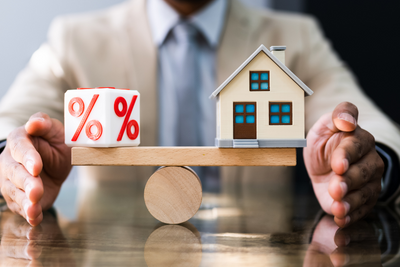
When it comes to getting a mortgage, it’s easy to focus on the interest rate. But, if you only focus on the interest rate, you might be missing some “hidden” fees that make getting that interest rate more expensive.
That sounds counterproductive – but it isn’t. Several factors will help create the best mortgage and interest rate available to each of us.
As a homebuyer, you need to make sure you are looking at the entire loan picture and how each factor can influence each other:
- the time period you plan to own the home,
- the loan product, and
- the terms of the loan
Time Period – How Long You Plan to Own
One reason to shop around and talk to different lenders is to get a sense of what loan products will work best with your budget and your goals as a homeowner.
You need to ask yourself questions about your finances and future, since buying a home is a commitment. That’s why the “go-to” 30-year fixed loan may not be the right choice for you that it was for your friend or a family member.
If you don’t plan on owning this home for more than 5 or 6 years, you might want to consider an adjustable-rate mortgage (ARM). These loans typically offer a substantially lower interest rate, saving you thousands of dollars while you live there.
The ARMs of today are much, much better and are more straight-forward, conservative, and safer for homeowners than the ones in the past.
It’s worth considering one of today’s ARMs if you really aren’t going to own this home for more than a few years. If you invest the extra money you’d save with your monthly mortgage payment because of its lower rate, you could really do much better than having had higher mortgage payments with the 30-year fixed loan.
This recommendation can be a hard one for many people. What’s right for one person could be the worst decision for another, so really consider YOUR personal situation and make decisions about your mortgage accordingly.
Points — Should You or Shouldn’t You Pay
As a buyer you’ll come across a mortgage chart with examples of interest rates next to “points” or “discount points.” This is usually for 30-year fixed rate loans.
As a first-time buyer you may be confused. You’re told if you pay one point, your interest rate will be lower than if you pay zero points, and if you pay two points even lower.
You may ask yourself what exactly are these points and should I pay them to get a lower rate? A point is equal to 1% of your mortgage amount (or $1,000 for every $100,000). So points are basically an “upfront payment of interest” at closing. Rather than pay it over the life of your loan, you can pay a large chunk when you get the loan.
Recently, interest rates were really low – so if you weren’t planning to stay in your home for more than 5 years or more, then paying points wouldn’t have made sense. Why? You would have never recouped the costs of your upfront payment over the life of the loan even if lower monthly payments may seem tempting.
However, if you plan to live in your home for many years (and since interest rates have gone up), then the benefit of the lower rate will kick in and save you money in the long run. However, you’ll need to determine if you can afford to pay an extra couple thousand or more at the time of your closing for those points.
As a buyer, you will need to weigh the pros and cons in getting the lower rate and paying for points upfront. Does it work with your long-term goals as a homeowner?
Fees – Beware of Hidden Ones
Don’t be fooled by low advertised rates! Behind that rate could be a long list of fees, points, or closing costs. Ask the lender to break down the fees and give you the total amount for closing the loan.
Avoid penalties for lock-in extensions. Some lenders will increase your interest rate slightly if you need to lock in your loan for 60 days or more. Make sure you know any requirements before signing any paperwork. It’s another reason to get all of your finances and paperwork in order before you apply for a loan.
Review fees for FHA loans. Don’t always assume an FHA loan will be cheaper or better. Not only do you pay an upfront premium for mortgage insurance (1.75% of the loan amount), but you’ll also pay a recurring annual cost of up to 1.35% of the outstanding loan amount (added to the monthly payment) for the life of the loan. Review the pros and cons of these loans carefully.
Take advantage of the mortgage disclosure forms. There is no excuse for buyers not to know about “hidden fees” with these disclosure forms that show the loan’s terms and cost to borrowers — the Loan Estimate, given three business days after application, and the Closing Disclosure, given three business days before closing.
As you can see, there are many “puzzle pieces” that go into getting the best interest rate for your mortgage. Carefully consider all the factors covered above and play out different scenarios.
Remember, I’m here to help you make all of this less confusing. I can help make sense of all the mortgage options you have and help you get the very best interest rate for YOU.
Hi, there!
I'm Mike and I love helping buyers discover what's really important in their forever home, then working to find that in Chicago's
Northwest Suburbs. I also have a soft spot in my heart for teachers and love giving back to them whenever I can. Let me know how I can help you make your real estate dreams come true.
mike@rechicagoland.com
buy
SELL/Homeowner
NorthWest Suburbs
schedule your free consultation
or email me!